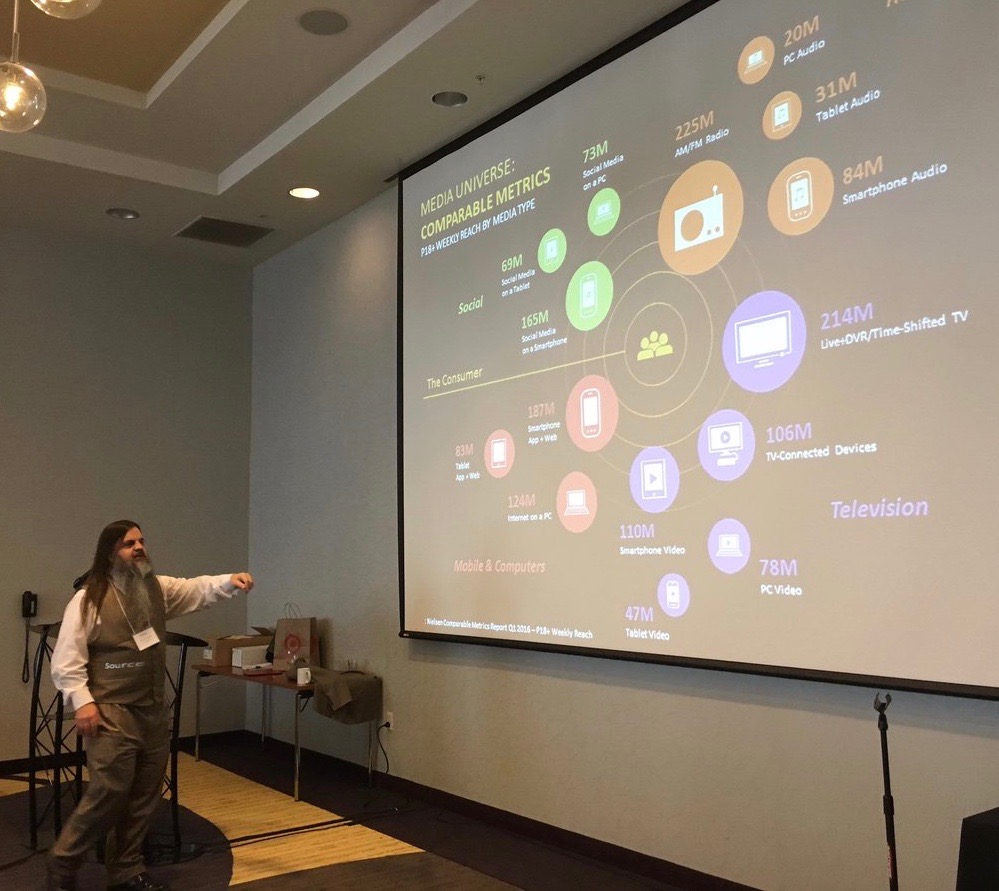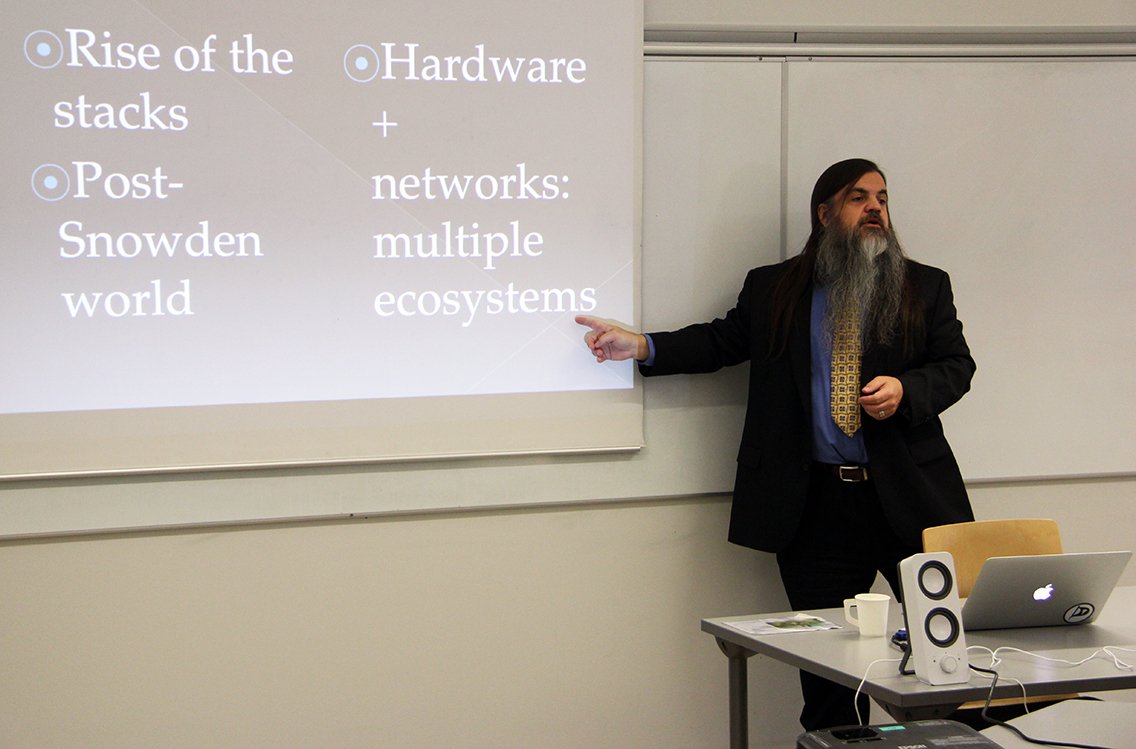Three and a half years ago we launched a consulting business. In my continuing spirit of openness I’d like to update you on how things are going, and to look ahead to the next year. Naturally your questions and other feedback are very welcome.
I hope this is of interest to anyone interested in, well, myself, but also for people thinking about higher education, about consulting, independent researchers, and being open in the 21st century. Consider this a glimpse into a small business, the practice of a futurist, and an independent scholar.
(If you haven’t followed this story, here’s the post announcing BAC’s launch, and here’s the company’s home page. Go on. We’ll be here when you come back.)

Speaking in Iceland.
Short version: things are going well. Media production is up. Some medium- and large-size options are in the air. It still feels like a hyperactive think tank. And there is a huge, crying need for future of education services and thinking.
Longer version: BAC continues to hum along, fulfilling its main mission of helping people think about the future of education. Our client base continues to grow, including a burgeoning number of international clients. I’m delighted to work with this rich community of educators.
Operations and services: BAC’s main work consists of consulting, speaking engagements, and media content production. The latter includes videoconferences, interviews, videos, podcasts, books, and articles, not to mention an active social media habit.
Consulting covers a wide range of topics. So far that has included meeting facilitation, conference facilitation, helping clients with strategic planning, assessing technology capacities, polling large populations, conducting focus groups, leading workshops,
The majority of these are face-to-face events, always at a client’s or third party location. Some consulting and presentation occur virtually. Media content production – well, I would say it’s done from our home office, but notorious bandwidth problems mean we spend a growing proportion of our time traveling to locations with better connectivity.
Clients: BAC has worked with 74 paying clients (and yes, the web page is almost done) over the past three and a half years. They range from liberal arts colleges to government offices, community colleges to public libraries, professional associations and state higher education systems. Most of them are located in the United States, plus others in Canada, Africa, east Asia, and across Europe. Some of these are one-offs, practically, where they wanted BAC for a specific service, and that’s it. Others are ongoing, with multiple relationships and even continuous communication. More are coming up over the next year, including some from new (to me) nations: Mexico, Singapore, and Spain.
This is in some ways my favorite part of the work. I love knowing, working with, learning from so many people in the education world, striving to glimpse what comes next. I’m delighted and humbled at the richness of the relationships.
Finances: speaking engagements are BAC’s mainstay, providing roughly 65% of our revenue (that proportion and that absolute amount keeps growing). Consulting services account for about 20%. The remaining 15% comes from sponsored research, FTTE and Future Trends Forum sponsorships, FTTE reader contributions, and book royalties.
We increased fees incrementally this year: $7000 for an on-site speaking engagement, $1500 for a virtual presentation, $2500/day for consulting. The increase did not slow down inquiries and engagements; actually, the opposite occurred. We still request that clients assume travel costs (transport, lodging, food, printing, etc), and have added two surcharges. There’s an extra fee for travel in winter, given the realities of the north country, and a financial service charge if the clients would like us to pay for travel ahead of time, prior to reimbursement.

Outreach/marketing: I’m fascinating by how writers and consultants get the word out. It’s actually a difficult question to answer, partly because so many consultants prefer to shun digital media, and also due to the challenges of determining who heard what through which channels.
That said, BAC wins attention through a mix of outreach methods. Face-to-face meetings and word of mouth are reliable generators of conversation, contacts, and inquiries. I habitually give away a box of cards and stack of FTTE reports with every trip, because the results are good. Social media, including video, also generates sound levels of interest. Videos of my speaking, articles outlining arguments, interviews bashing out ideas are apparently good evidence of who this Bryan Alexander character is, and why you might engage him.
I’m not sure what role my books play in outreach. People do like citing them when they mention me. Perhaps they are academic bona fides alone.
Typical week: it’s hard to identify a typical set of days, actually, since my schedule is so variable, but let me try to sketch out a sample.
I spend a minimum of three hours each day in research. This includes working through social media, reading books and articles, listening to audio and video, then sharing some of the results through social media to spur conversation and improve my understanding.
About four hours a day goes to email. This covers just about everything, from answering inquiries, pinging established clients, sharing research, checking contributions, participating in professional discussions, and dealing with logistics. People send me all kinds of stuff.
Once per week is a Future Trends Forum session, which involves significant preparation: finding guests, arranging for a location with sufficient bandwidth and privacy, sending out announcement emails, working with the guest to determine questions, actually holding the event (I allocate 2 hours for the 1 hour session), and following up.
I have between three and fifteen meetings per week, usually virtual ones (via Skype, Shindig, phone, Google+ Hangout, etc.). I make a point of not wasting people’s time, although I do take care to establish and maintain the personal connections that mean so much to me.
Travel soaks up time, but unpredictably. I have weeks where I stay home, and weeks where I visit two different countries. Some trips are relatively nearby, so I can drive, while the rest require planes. Each day of travel necessitates a full day of recovery – not for healthy, but of catching up on emails and other communications.
Some number of hours each week go to non-gig-related driving. It takes 35 minutes to get from our house to the nearest town, at a minimum (longer with bad weather). It’s 90 minutes each way to the nearest airport and city.
 I write FTTE reports every day for an audience of nearly 2000 subscribers (plus the shadowy, larger realm of forwarded reports), adding trend items as they pass through my research filter. That can amount to about 15-45 minutes per day, until the end of the month. Then preparing the final report and sending it out requires a full business day.
I write FTTE reports every day for an audience of nearly 2000 subscribers (plus the shadowy, larger realm of forwarded reports), adding trend items as they pass through my research filter. That can amount to about 15-45 minutes per day, until the end of the month. Then preparing the final report and sending it out requires a full business day.
I write other, non-sponsored stuff (articles, books) for perhaps one hour a day on average.
Ceredwyn and I live together, so it should be easy to meet. But we’re also parents, homesteaders, and married, so we find it easier to arrange for actual business strategy meetings, about once a week.
It’s ultimately hard to determine a schedule with precision, not just because the nature of the work is uneven. I blend my work into the rest of life. For example, I listen to podcasts while doing housework, chopping wood, and weeding plants. I work as much as I can during family vacations, unfortunately. My school board work, which is winding down, is partly community involvement, but also connects to my research.
It’s continuous work. Unlike the academic calendar, my work is just ongoing. When one project or engagement ends, there are always others still in process.
Personal notes: this is exciting and rewarding work. Every day presents challenges and new ideas, from logistics to the future of education. Every day brings connections with people, which I relish. Overall, the practice is pretty time-consuming. Ceredwyn has a full time job handling the financial backend. I work between 60 and 70 hours per week.
I said a lot of this is challenging and new, but I should also add how much is now habitual. I’m always doing outreach, and that’s instinctual now. I’m always looking for futures signals. I’m disturbingly familiar with the torments are rare delights of air travel.
Looking ahead, I turn 50 in February. Realistically I’ll probably have to cut my work week down to, say, 59 hours. I’m not sure how to do that, to be honest.
Options for 2017:

Presenting in Helsinki.
- Moving the home office. As we announced recently, Vermont’s failure to address rural broadband means we will move next year, probably during the summer or fall. We are exploring possible locations.
- Restructuring media work. FTTE and the Future Trends Forum have been successful, growing a fine audience – well, really a network or community. There have been calls to add a podcast to this pdf and video work, which appeal to me. Which brings to mind two questions.
First, should we reorganize this media work into something more clearly branded or understood? The logistics of wrangling a pdf publication, a live videoconference, ongoing video production, and also audio production are a bit hairy. Second, how can we sustain it? So far NYSERNet and Shindig generously help keep FTTE and the Forum going, and each contributes to paying work, but the amount of time I spend is growing steadily. About 5% of FTTE subscribers contribute small amounts, which is gratifying, but not enough. Should we solicit more sponsorships, or set up a Patreon account, or run ads, or….? - Writing. I’m finishing up a second edition of The New Digital Storytelling. I have a long-overdue book proposal on the future of education, drawing on FTTE research and this blog. I’m also considering producing some ebooks, including one on public speaking. Various articles are in the works, and I’m often asked to write more. I don’t have enough time for this, as the business demands so many hours (see above).
- Adding staff. BAC is Ceredwyn and I, full time, plus various people we engage for specific tasks (designers, an accountant, consultants). Bandwidth has limited our growth, but we’d like to start adding people. The trick is to chunk out tasks in manageable, discrete units.
- Retainer service. Some clients regularly contact me for feedback and advice, which is gratifying. We should consider formalizing this into a separate service.
- Residencies. In November I spent a good week in Helsinki, sweetly hosted by Arcada University. This gave me the opportunity to learn more about higher education there, while doing some writing. Perhaps this is something I should do more of.
- Fellow. In the past I’ve been a fellow for several organizations, but am not now. Is this worth seeking again?
- The book club. This has grown in energy and readership, which is a treat. How should this evolve in 2017?
- Stop! Is there anything I should do less of?
How about you? What do you think of BAC as 2017 looms?
(cool photo of me with lights on my face by Valgardur Gislason; me versus slide by Peter Gunn)





Love what you are doing and how it is all developing. You are one of my chief thought leaders in this field. More power to you and your home move.
Thank you very much, Ted. It’s great seeing you at the Forum.
Hi Bryan
This is the most useful email I have ever received. Second only to the last one regarding BAC. Thank you. I would like to request a (email, phone, video?) consultation to discuss designing an educational pathway for a 62 year old retired scientific glassblower after receiving an Associates of Arts degree in Sociology. An interesting challenge, eh?
âUnder *Typical week:* Each day of travel necessitates a full day of recovery – not for [health], but [for] catching up on emails and other communications. Under *Personal notes*: I’m disturbingly familiar with the torments are rare delights of air travel. [?]
Peace & Resistance
Mark Corbett Wilson
âIn a world of change, the learners shall inherit the earth, while the learned shall find themselves perfectly suited for a world that no longer exists.â ~ Eric Hoffer
On Fri, Dec 9, 2016 at 8:22 AM, Bryan Alexander wrote:
> Bryan Alexander posted: “Three and a half years ago we launched a > consulting business. In my continuing spirit of openness I’d like to > update you on how things are going, and to look ahead to the next year. > Naturally your questions and other feedback are very welcome. I hope” >
A splendid challenge. How about the last week of Dec., between Christmas and the New Year?
Ack, the confusion of so many platforms. I didn’t see your reply because I responded via email and when I didn’t hear from you I just assumed you were busy. Can we try this spring?
No problem. Ready then.
Congratulations, Bryan!
Thank you, Howard.
Congrats on the success and gratitude for being transparent re fees, etc.
Thank you.
I’m trying my best to share what I – we – are doing and learning. It’s clear that it’s not successful so far, as too many people aren’t seeing it.
Bryan,
Congratulations. You continue to be an inspiration as I ponder and plot my own move into helping other faculty activize their classrooms. And, I now know – we were born in the same year, but I beat you by one month!
Happy New Year and much Progress, Peace, and Prosperity.
Gretchen McKay
You are so kind, fellow 1967 baby.
Regarding your media work, I wonder whether there’s an opportunity for a practicum or internship there. I can imagine lots of students in library science and faculty development programs who might benefit from deep exposure to your process. (Maybe even some folks in PR and media production more generally.) There’s always the question of whether the work is meaningful for the student and a net savings of labor for you, but it might be worth making a few inquiries…
Great idea, and I’ve gotten a few inquiries.
Anyone at Kenyon?
Pingback: Me making more media: how can it be sustained in 2017? | Bryan Alexander
Pingback: Four years in: under the hood of my consulting firm | Bryan Alexander
Pingback: CogDog It Company Report – CogDogBlog